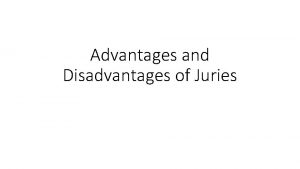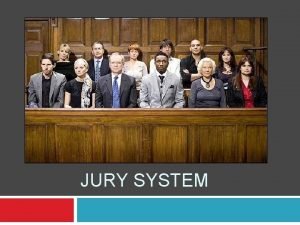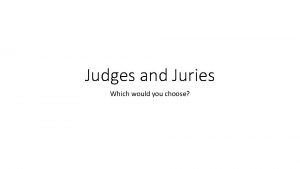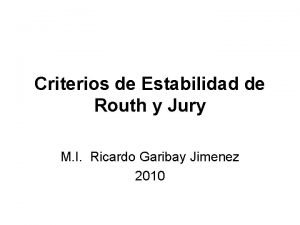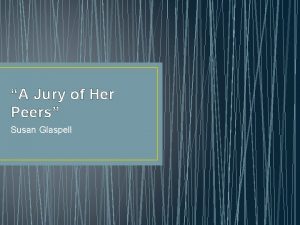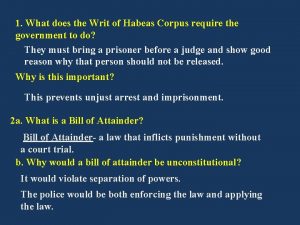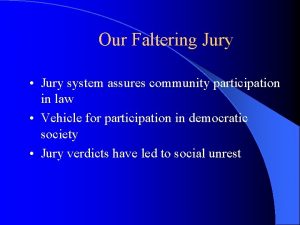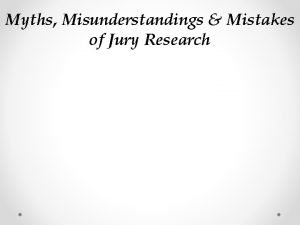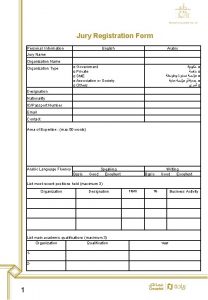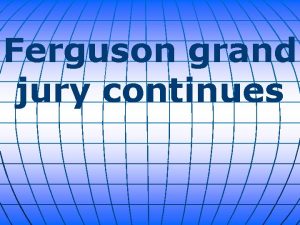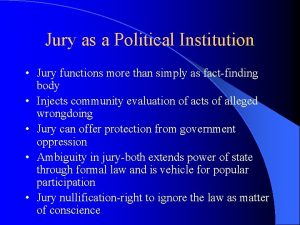The Jury System Origins of Jury System The










- Slides: 10

The Jury System

Origins of Jury System § The idea of juries deciding guilt comes from Greece and Rome § Their juries were huge – as many as 1501 § (why a number like that? ) § Henry II of England used 12 man jury to resolve land disputes. § Criminal cases were decided by “ordeal”. Accused had to undertake/endure a physical task to prove their case – based on idea that God would protect the “innocent” § Magna Carta introduces idea that all men should have cases heard by their equals § In US 5 th , 6 th and 7 th amendments extend the right of jury trial to all accused

Juries • One of the features of the American Justice system is the concept of a jury. • In America a jury is usually a group of twelve people who preside at a trial and determine the innocence or guilt of the person on trial. • The use of the jury system is an important protection against judicial tyranny and represents the voice of the people.

Who Comprises a Jury? • A jury is composed of average citizens who are selected from the voter registration list. • Any citizen over 21 who is registered to vote can be a juror. • This is one of the main ways in which men and women take part in the government.

§ A juror receives notice through the mail that he or she has been chosen for jury duty and it is his or her responsibility to accept and appear for selection. § Jurors are called for varying periods of time according to state law, usually for two weeks. § If they are workers, employers have to excuse them from their work. § Jurors are paid. (By their employers if they are paid hourly or by the courts if they are salaried. )

• Jurors are part of a large pool and are questioned by the lawyers. This process is called VOIR DIRE. • Voir Dire is the process by which attorneys select, or perhaps more appropriately reject, certain jurors to hear a case. – They want to know biases and background that will affect the decisions the juror might reach!

• At a trial, the jury listens to both the defense and the prosecution. • They hear the testimony of witnesses and the arguments of lawyers on both sides of the case. • They are presented with evidence, either concrete or circumstantial. • Because they are not legal experts, the judge presiding over the case gives them directions to follow to help them make a decision.

• When the time comes for them to deliberate, they are ushered into a closed room where they decide if the defendant is guilty or innocent. – All twelve members must be in agreement for a verdict to be given in a criminal case. • If only one member of the jury refuses to go along with the other eleven, the situation is called a hung jury. • At this point a new jury might have to be selected and the entire trial process repeated.

• The decision, however, is completely theirs. • Jury verdicts represent “the common sense judgments of ordinary people” • Critics of the system claim that clever lawyers often use psychology to influence a jury.

Pros and Cons of Juries Pros Cons • More fair if you are not part of the government • Allows for a large group of impartial people to make the decision. • No legal expertise to draw on • More likely to decide based on emotion rather than fact
